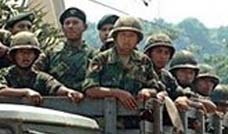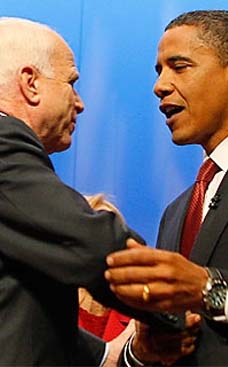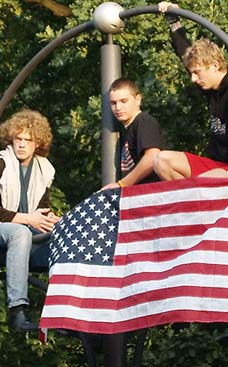
Snodgrass, who has always voted Democratic, was paying close attention to the Presidential campaign—she had taped both candidates’ Convention speeches, and watched them when she had time—but her faith in politicians was somewhere close to zero. She wanted a leader who would watch out for people in the “middle class,” people like her who had no one on their side. “I think McCain is going to be just like Bush the next eight years,” she said. “I don’t see how it’s going to change.” To her, Sarah Palin, a working mother close to her own age, felt more like a token choice than like a kindred spirit. “I think McCain picked her so women can relate to her, not because she’s the best person for the job,” Snodgrass said. “She’s more of a show for the American family.” Hillary Clinton had been better, but even she couldn’t fully apprehend Barbie Snodgrass’s predicament.Journalist George Packer served as a Peace Corps Volunteer in Togo.
George Packer writes: The disaffection of Ohio’s working class
The Hardest Vote
The disaffection of Ohio’s working class.
by George Packer
[Excerpt]
Barbie Snodgrass had agreed to meet me at a Kentucky Fried Chicken outlet, on a strip of fast-food restaurants and auto shops west of downtown Columbus, Ohio, but she didn’t have much time to talk. Her shift as a receptionist at a medical clinic, which got her out of the house at six in the morning, had just ended, at three; the drive home, to a housing development in a working-class suburb south of the city, took half an hour. She then had a little more than an hour to eat, change clothes, let the dog out, check up on her sister’s two teen-age daughters—Sierra and Ashley, who were under her care—and then drive back into Columbus, where she worked the evening shift cleaning the studios of a local television station, and where her day ended, at ten. She also worked some weekends. She was forty-two, single, overweight, and suffering from stomach pains.
Snodgrass sat down at my table and refused the offer of a soft drink. She was wearing a drab ensemble of gray cotton sweatpants and a loose-fitting pale-yellow knit top, and her brown hair fell in bangs just above her eyes. I asked for her thoughts about the Presidential candidates, and she said, “Someone who makes two hundred or three hundred thousand a year, who eats a regular meal, who doesn’t have to struggle, who doesn’t worry if the lights are going to be turned out—if he doesn’t walk in your shoes, he can’t understand.”
In Snodgrass’s shoes, it hardly made sense to draw a paycheck. “You’re working for what?” she asked. She hadn’t finished college, and the two jobs that kept her “constantly moving” brought in a little more than forty thousand dollars a year, but after the mortgage (a thousand a month), car payments (three hundred and fifty), levies for supplies at the girls’ public high school, fuel, electricity, stomach medicine, and a hundred dollars’ worth of groceries each week (down from eight bags to four at Kroger’s supermarket, because of inflation) there was basically nothing left to spend. She could cut corners—go out for a McDonald’s Dollar Meal instead of spending seven dollars on a bag of potatoes and cooking at home. But that meant the end of any kind of family life for her nieces.
“These days, you have to struggle,” she said. “As a kid, I used to be able to go to the movies or to the zoo. Now you can’t take your children to the zoo or go to the movies, because you’ve got to think how you’re going to put food on the table.” Snodgrass’s parents had raised four children on two modest incomes, without the ceaseless stress that she was enduring. But the two-parent family was now available only to the “very privileged.” She said that she had ten good friends; eight of them were childless or, like her, unmarried with kids. “That’s who’s middle-class now,” she said. “Two parents, two kids? That’s over. People looked out for me. These kids nowadays don’t have nobody to look out for them. You’re one week away from (a) losing your job, or (b) not having a paycheck.”
Snodgrass, who has always voted Democratic, was paying close attention to the Presidential campaign—she had taped both candidates’ Convention speeches, and watched them when she had time—but her faith in politicians was somewhere close to zero. She wanted a leader who would watch out for people in the “middle class,” people like her who had no one on their side. “I think McCain is going to be just like Bush the next eight years,” she said. “I don’t see how it’s going to change.” To her, Sarah Palin, a working mother close to her own age, felt more like a token choice than like a kindred spirit. “I think McCain picked her so women can relate to her, not because she’s the best person for the job,” Snodgrass said. “She’s more of a show for the American family.” Hillary Clinton had been better, but even she couldn’t fully apprehend Barbie Snodgrass’s predicament.
She remained uninspired by Barack Obama. His Convention speech had gone into detail about his policy proposals on matters like the economy and health care, which seemed tailored to attract a voter like Snodgrass, but they filled her with suspicion. His promise to rescind the Bush tax cuts for wealthier Americans struck her as incredible: “How many people do you know who make two hundred and fifty thousand dollars? What is that, five per cent of the United States? That’s a joke! If he starts at a hundred thousand, I might listen. Two hundred fifty—that’s to me like people who hit the lottery.” In fact, only two per cent of Americans make more than a quarter of a million dollars a year, but that group earns twelve per cent of the national income. Nonetheless, the circumstances of Snodgrass’s life made it impossible for her to imagine that there could possibly be enough taxable money in Obama’s upper-income category—which meant that he was being dishonest, and that she would eventually be the one to pay. “He’ll keep going down, and when it’s to people who make forty-five or fifty thousand it’s going to hit me,” she said. “I’d have to sell my home and live in a five-hundred-dollar-a-month apartment with gang bangers out in my yard, and I’d be scared to death to leave my house.”
Read the rest of the article.













